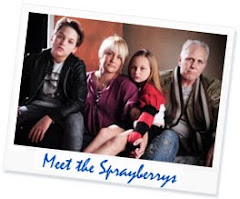 Rejection - Part I
Rejection - Part IFor those in Showbiz, I believe that we must first learn that rejection is not rejection as one would normally think of it. Casting doesn't (thank goodness) walk out and say, "Hey, guess what? We didn't like your work. You stink. See ya later. Better luck next time."
In fact, casting wants you to do well; they are your friends and when the right person comes along and fits the part, it makes their job so much easier.
So if you have images of the Simon Cowell type interrupting in the middle of your child's audition with a disgruntled, "That was the most horrible thing..." (complete with British accent) try
 not to worry - that is, after all, just for TV... no pun intended.
not to worry - that is, after all, just for TV... no pun intended.It really comes down to how you deal with rejection - how you and your children internally deal with not getting the work and, most importantly, how you move on and stay positive and shift your focus to the next opportunity rather than harping on the past. In order to book work, you have to do good work [auditions] and in order to do good work, you have to be in the right (and positive) mindset.
So how do you get this positive mindset and how do you help your kids get it as well? It's tough, but you have to manage the rejection in your head. It's the hardest thing to learn. We call it the "Emotional Roller Coaster." One minute you get offered an audition and
 you're up - you're riding in the coaster car, heart pounding, up the hill. Clink,clink,clink,clink (get the image?). Then you're at the top of the hill, looking up, looking down. Will you get the part? When you do, you keep climbing like one of those little "fake-you-out" hills that some coasters have. If you don't get the part, you may find your emotions zooming quickly down the hill - your heart in your throat. Then you level out and head up the hill again.
you're up - you're riding in the coaster car, heart pounding, up the hill. Clink,clink,clink,clink (get the image?). Then you're at the top of the hill, looking up, looking down. Will you get the part? When you do, you keep climbing like one of those little "fake-you-out" hills that some coasters have. If you don't get the part, you may find your emotions zooming quickly down the hill - your heart in your throat. Then you level out and head up the hill again.The key is to try to level out those steep hills. We have learned and continue to learn that it is about staying positive even when we're heading down the hill. Maintaining great conviction and belief that we have what it takes to succeed in Hollywood helps us manage the times of rejection. We simply do this through confirmation and feedback from our talent team.
Booking jobs doesn't hurt either. When we don't book, we remind ourselves of when we did. If you're new to this and haven't booked or don't have a talent agent or manager yet, perhaps you can shift the focus from the concept of actually booking jobs to the concept of simply making the attempt. If your child knows that the goal is to do his best and have fun and work hard rather than specifically booking the job or signing the agent, rejection is easier to handle. While you may not always get the job, your child is likely to be able to say he/she did his/her best.
For us, if we did not have confirmation early on we would not have hung tough, as I always say. Without confirmations we would have had to recognize that this wasn't to be and that it was time to pack it up. Decide what is going to help you confirm and at what moment you will shift what those confirmations are (from "doing your best and having fun" to "signing agents and booking jobs").
Rejection is very different for each child and family and success with overcoming it moves in stages. Well, this is our experience. I know Children In Film has a Child/ Family psychologist on their Board of Advisors if you're looking for a more professional view on rejection.
My next blog will go into detail about these "Stages" or the learning process that happens on your path towards showbiz success.






.jpg)

